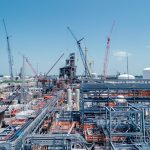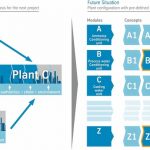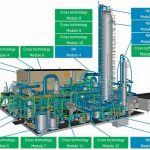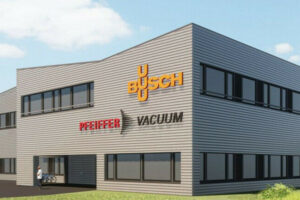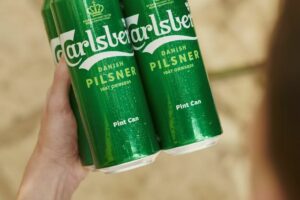Meeting complex customer wishes with tailored individual solutions was for a long time regarded as the big strength of the European engineering and construction industry. However, increasing price pressure and growing local competition call for new solutions. One key to success: smart modularisation concepts that bring the construction of bespoke, customised plants into unison with standardisation and high efficiency. As one of the first engineering companies worldwide, Thyssenkrupp is taking new paths with the “Pre-Configured Plant Concept” (PCPC).
Modularisation and standardisation are topics everyone is talking about in the engineering sector. The savings potential is considerable: utilising existing solutions in new projects is one of the most effective levers to control costs and product variance in the manufacturing industry. As yet, machine manufacturers and engineering companies are still taking different approaches: many of the former are increasingly using modular product architectures in order to move from engineer-to-order to configure-to-order.
In the engineering sector, customer solutions are characterised by immense diversity and functional complexity. For a long time, it was considered impossible to modularise large plants and configure them from a digital product system. The term modularisation was mainly used to describe the splitting up of plants into individual package units. New plant projects today are commonly put together from templates of previous projects, copying existing plant elements (copy plant model).
However, the copy plant model has decisive weaknesses: complexity increases with each new plant configuration, as there is no transparent relationship between functions and components. In addition, new improvements are not automatically incorporated into older templates. To put it briefly: over time, the copy plant model becomes a problem rather than a solution.
Modular plant engineering can do more
Challenges such as increasing competition as well as rising price and margin pressure call for new ideas. If the aims of modularisation are to optimise reusability, shorten project durations and at the same time minimise risk factors in the bidding process, the solution has to be smart.
As a global engineering company Thyssenkrupp Industrial Solutions designs plants for the chemical industry amongst others. Each plant is unique, but they all feature a number of functionally identical components. If you can model the structure of a plant digitally, these components can be standardised along the lines of a shared parts strategy. In this way, large plants actually become configurable – that’s the idea behind functional modularisation.
It was on this basis that Thyssenkrupp Industrial Solutions developed the Pre-Configured Plant Concept – a smart, digital, modularised product model for configurable chemical plants. As one of the first companies worldwide, Thyssenkrupp is taking the path of functional modularisation in the engineering sector.
The development of the concept began in autumn 2016. Only a year later the first modular, configurable plant type went into operation. Today, already, new fertiliser plants are being designed on the modular system and no longer on the copy plant model.
Learning from machinery manufacturers
The Pre-Configured Plant Concept is based on the so-called Metus methodology, which has become established above all in the automobile and machinery sectors over the past 15 years. With the aid of this methodology, products are split up into functions and components. Interdependencies and variant drivers are identified and ultimately the components of a product are grouped into functional modules. In this way, different customer requirements can be transformed into a modular product model.
The Pre-Configured Plant Concept offers decisive advantages:
- Despite modularisation and standardisation, individual customer needs can still be satisfied. Modularisation in this case does not mean reducing everything to standard configurations. As each module can display the feature in a customer-specific manner, the original flexibility is retained – but without the typical disadvantages: customer-specific costs can now be identified directly and evaluated early and reliably.
- Clients, too, benefit by being able to select from a modular system beyond their individual requirements. For example, if a better standard module is available, clients can choose it for their application instead of a bespoke solution. Thus, cost advantages can be achieved and customer value increased.
- Thanks to the Pre-Configured Plant Concept, the well-known advantages of modular product structures can also be applied to the engineering and construction sector: standardised interfaces between the modules ensure lower integration effort and less complexity. The re-use of modules means development times can be shortened. This saves costs in the bidding phase and reduces sources of errors. For instance, tests for certain modules only have to be carried out once. The result: significant time and cost savings combined with higher quality and efficiency.
From idea to concept
Owing to the many different types of plants in its portfolio, it was important for Thyssenkrupp after the project launch to be able to operate autonomously in its methods and largely independently of external service providers. One key requirement for the new system was therefore that plants should be mapped in a digital product model, which Thyssenkrupp engineers could add to and extend themselves – a configurable digital twin creating the bridge from client requirements to product structure.
The project was implemented in conjunction with the Munich-based solutions company ID-Consult. The collaboration came about after it was found during the selection process that advice on modularisation alone would not be enough. Only a complete view of the product – from market requirements to product architecture – and its modelling in software could move the project forward decisively.
Together, ID-Consult and Thyssenkrupp developed a three-phase plan. The first phase involved introducing the Metus methodology initially for engineering nitric acid plants. At the same time, an extensive know-how transfer was planned in order to ensure knowledge of methods and tools was passed on to future users. After a successful first run, further plant types would then be modularised independently by Thyssenkrupp’s engineers.
Shortly after the start of the project it became apparent that other areas also wanted to use the new method. The PCPC was therefore expanded to include a second plant technology (ammonia). This opened up new possibilities: modularisation could now be considered across multiple plant types. The advantage of this was that numerous functions – for example water treatment or the control pulpit – could be designed as cross-technology modules and utilised largely identically across different types of plants. Today, Thyssenkrupp uses the Pre-Configured Plant Concept successfully to design a variety of plants.
The future lies in smart modularisation
The Pre-Configured Plant Concept developed by Thyssenkrupp is a functional modularisation concept for chemical plants that saves time and costs when designing new plants and increases the productivity of the designer. The digital, modular system delivers engineering designs that are tailored to individual customer requirements despite standardisation.
The concept offers three main advantages: increased customer value thanks to reduced costs and unchanged flexibility, higher quality because there are fewer error sources and shorter project durations. Thyssenkrupp uses the Pre-Configured Plant Concept for four different technologies: nitric acid, ammonia, hydrogen and ammonium nitrate. And its potential is far from beeing exhausted: further plant types will follow. In terms of methodology the company operates independently. The Metus software continues to be used to model product architectures and their respective interdependencies.
Online search: cpp0218thyssenkrupp
Hall 9.1, Booth C3
Statement
Modularisation as such is already a promising concept: Only a modular product can also be a configurable product – and configuring is usually easier and cheaper than engineering from scratch. The concept becomes smart when – as with Thyssenkrupp’s Pre-Configured Plant Concept (PCPC) – you can have customised add-ons despite modularisation. The combination of modularisation and flexibility is what makes the concept smart. But there’s a lot more to it: What makes the concept special are the so-called cross-technology modules. Through the functional description it was realised very early on that the same functions are needed in different plant types but are being implemented individually in different ways. PCPC unlocks this significant standardisation potential by providing a modular product system that can serve all types of plant. With every further plant type added to the system the positive effect is reinforced.
Author: Johannes Dammeier
Senior Process Engineer
Nitrates & Phosphates,
Thyssenkrupp Industrial Solutions



